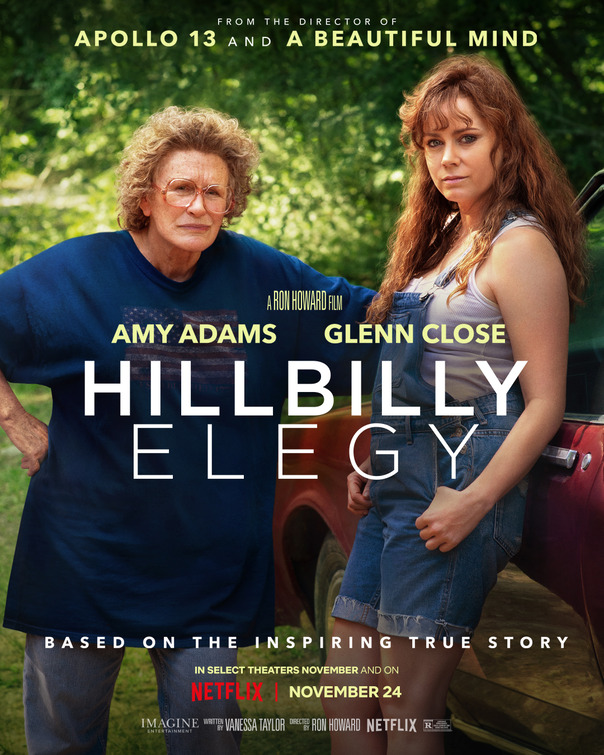HILLBILLY ELEGY (NETFLIX) (2020)
SYNOPSIS: J.D. Vance (Gabriel Basso), a former Marine from southern Ohio and current Yale Law student, is on the verge of landing his dream job when a family crisis forces him to return to the home he’s tried to forget. J.D. must navigate the complex dynamics of his Appalachian family, including his volatile relationship with his mother Bev (Amy Adams), who’s struggling with addiction. Fueled by memories of his grandmother Mamaw (Glenn Close), the resilient and whip-smart woman who raised him, J.D. comes to embrace his family’s indelible imprint on his own personal journey. Based on J.D. Vance’s #1 New York Times Bestseller and directed by Academy Award winner Ron Howard, HILLBILLY ELEGY is a powerful personal memoir that offers a window into one family’s personal journey of survival and triumph. By following three colorful generations through their unique struggles, J.D.’s family story explores the highs and lows that define his family’s experience.
MOVIE REVIEW:
A totally unrecognizable Glenn Close and Amy Adams plays a pair of mother-and-daughter in Ron Howard’s much maligned drama, Hillbilly Elegy which in turn is based on the memoir by J.D. Vance, a man who rose from a troubled family to attend Yale law school. Is it an inspirational drama or a complex study on poverty and dysfunctional families? Either way, it’s an enjoyable watching experience featuring two powerhouse actresses at their peak.
An adult J.D. Vance (Gabriel Basso) is attending Yale and busy working three jobs to finance his pricey education. He needs to land an internship urgently to continue his studies. But when his sister, Lindsay (Haley Bennett) calls, he is torn between going back to Ohio to attend to his mother, Bev (Adams) who has landed in hospital because of heroin abuse or staying on to look for an interview.
Hillbilly Elegy is a drama that constantly juggles between the past and present. Sometimes we see the present adult J.D. struggling to check his mum into a clinic. Sometime, we get flashbacks of a teenage J.D. under the charge of his beloved “mamaw” (Close) and his interactions with the emotionally volatile Bev. Probably it’s the death of his father or the pressure of her own troubled childhood that lead to the downfall of Bev. We never really know about Bev except she can’t keep her job as a nurse because of her drug issues and her frequent rotation of husbands.
“Mamaw” on the other hand didn’t have much of a good marriage either. In one particular flashback scene, we sees her setting fire to her drunk husband whom we presumed was also abusive towards her. It’s kind of troubling to learn that such issues exist in rural America though critics has hit out at Hillbilly Elegy for stereotyping and mere presenting a series of caricatures. Whether it’s Ron Howard and writer Vanessa Taylor being plain old dramatic with the material, the core of the story is written from the perspective of J.D. Vance, the man who lived through all the troubles, saved by his grandmother from falling into bad company and finally making it to Yale.
If there’s one slight problem with Hillbilly Elegy, it really never feels or adds up to a movie that is directed by an acclaimed filmmaker liked Ron Howard despite the cast assembled. Glenn Close and Amy Adams are terrific. With hours of makeup on, Close is intimating as a no-nonsense grandmother who will do anything for her grandson to go on the right path in life. Adams is screaming and wailing her heart out in nearly every scene as the opioid-addicted Bev. But the main lead however belongs to Gabriel Basso whose character spent most of his time reminiscing about his childhood, driving on the road and talking to his girlfriend, Usha (Freida Pinto) on the phone rather than doing something meaningful to drive his point and story across.
Hillbilly Elegy is a solid family drama best watched on the small screen. It’s a movie about an underdog achieving the American dream and escaping the poverty cycle while reflecting on the past. Perhaps one will be motivated by the efforts of J.D. Vance and his grandma. Those looking for a deeper narrative however might have to switch to another flick or the good old papers.
MOVIE RATING:




Review by Linus Tee

